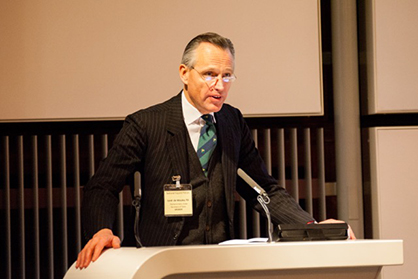paykwik al
online sportwetten
paykasa
paykwik
online sportwetten
paykasa
Equine Industry Unites Over Need For Workable Horse ID System
Implementation of a robust and workable equine ID system was pinpointed as the cornerstone for equine health, welfare and management in the UK, at the 23rd National Equine Forum, held on March 5th. Whether reviewing the Equine Sector 2015 General Election Manifesto for the Horse, discussing the practicalities of equine legislation, the management of health and disease control or the future of British Breeding, the common view was that an efficient equine identification database was pivotal to future success.
The Forum was attended by over 200 of the country’s most influential members of the equestrian industry, including NEF President HRH The Princess Royal, Lord De Mauley TD, Parliamentary Under Secretary of State for Natural Environment and Science at Defra, international equine vets, researchers, riders and trainers as well as equestrian trade business leaders. The event included a stirring celebration of some of the UK’s spectacular equestrian achievements of the past year, as well as the presentation of the Sir Colin Spedding Award to Paul Greeves, former Executive Director and Keeper of the General Stud Book at Weatherbys.
Lord De Mauley set the scene for the day by outlining the plans for the introduction of a strengthened, fit-for-purpose Equine ID regime throughout Europe. He explained, “A robust regulatory framework is important – but to be effective we need people to meet their responsibilities. I would ask you in the sector to help us improve awareness and compliance so people know the importance of doing the right thing.”
The Minister gave examples of how the horse industry has worked together successfully over the past year. In 2014, equine exports supported a market worth £96m to the UK economy. Fly grazing was being addressed with Government support for Julian Sturdy’s Private Member’s Bill on Control of Horses. In response to concerns voiced by the horse industry, the notifiable status of Contagious Equine Metritis (CEM) and Equine Viral Arteritis (EVA) had not been removed. The revised Tripartite Agreement had been successfully running since May 2014.
Steven Gale, Animal Health and Welfare Officer for Stockton on Tees Borough Council discussed the legislation available to Local Authorities to tackle equine welfare and the increase of fly grazing on Local Authority land. He called for the microchipping of all equines, a robust passport system, and owner details to be kept up-to-date using a fit-for-purpose central equine database. He also suggested the introduction of fixed penalty notices for non-adherence.
Jeanette Allen, Chair of the Equine Sector Council Steering Group and Chief Executive of The Horse Trust and Louise Kemble, Chair of the British Horse Industry Confederation and Chief Executive of the Thoroughbred Breeders’ Association presented the Equine Sector 2015 General Election Manifesto for the Horse http://bit.ly/17hr6u3. A key recommendation in the document is an update of the current horse passport system as a priority for improved health and welfare.
As a part of NEF’s new format, a panel representing Chief Veterinary Officers (CVOs) from the four UK countries debated their priorities on equine health and welfare in a changing world. Roly Owers, Chief Executive of World Horse Welfare, chaired the panel, which comprised Professor Tim Morris of the Animal Health and Welfare Board for England, Robert Huey, CVO for Northern Ireland, Sheila Voas, CVO for Scotland and Professor Jo Price from the Wales Animal Health and Welfare Framework. The consensus was for identification, traceability and individual national databases to feed into a central system, ideally encompassing all 28 EU member states. Northern Ireland’s policy of registering the premises at which the horse is kept was also recognized as a valuable implementation tool. Tim Morris concluded, “To make this work, the sector needs to work with the Government. It is very much in our sector’s hands to make sure we have a workable database.”
The enlightening first afternoon session, chaired by Professor Pat Harris, Head of the WALTHAM Equine Studies Group, explored the training and professional development opportunities in Further Education in the UK. Lisa Jarvis, Animal Health and Welfare Industry Product Manager at Lantra and Beth Maloney, owner of an equine training center and former Assistant Principal of a large FE college, outlined the current system and opened the discussion on whether we have ‘got the mix right.’ The constructive debate that followed will provide valuable input for the British Equestrian Federation workshop on this key issue due to be held in November.
In brief topical spots, Lynn Petersen, Chief Executive of the British Horse Society outlined the importance of the BHS Accident Log www.horseaccidents.org.uk to effect change and help make riding safer. Jane Nixon, Director of Equine Development at the British Equestrian Federation summarized the new British Breeders Network and its anticipated role in building a future for British Breeding www.britishbreedersnetwork.org .
In the concluding session on reflections and projections in the horse industry, Will Lambe, Director of Public Affairs and Policy at the British Horseracing Authority, reviewed the economic impact of racing which generates £3.45 billion in annual expenditure and provides direct, indirect and associated employment for some 85,000 people.
Claire Williams Executive Director and Secretary at the British Equestrian Trade Association (BETA) revealed some figures from the 2014/15 BETA National Equestrian Survey. According to the results, equestrian expenditure stands at £4.3bn (£3.8bn in 2010/11), 2.7 million people have ridden in the past 12 months (3.5 million in 2010/11), 446 thousand people keep horses (451 thousand in 2010/11) and there are 944,000 horses in the UK (988,000 in 2010/11).
Andrew Finding, Chief Executive of the British Equestrian Federation, emphasized how important it is for the whole of the equine sector to help increase participation in equestrianism through Hoof, www.hoofride.co.uk, a valuable legacy of 2012.
The full proceedings can be downloaded at www.bef.co.uk on the National Equine Forum page. The 2016 National Equine Forum will be held on Thursday 3rd March at the Institution of Mechanical Engineers, Westminster, London.











